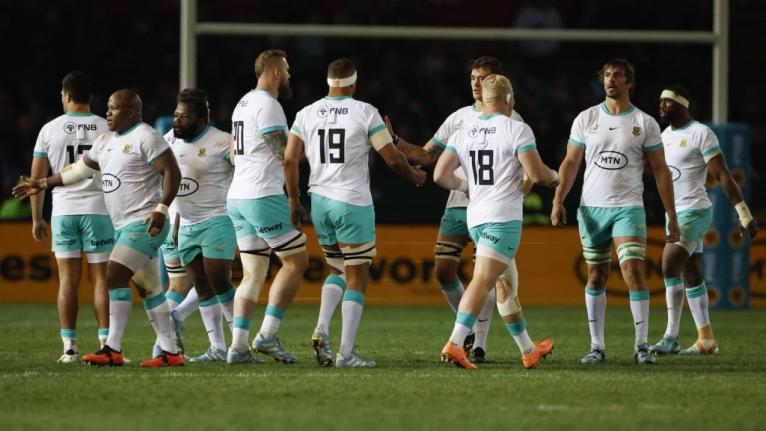Around the 50th minute of the titanic Test at Loftus Versfeld last Saturday, Ireland’s players would have looked to the sideline to see a cluster of Springboks entering the fray. Six forwards jogged off the pitch, while another six – four of them World Cup-winners – took up their positions. Boosted by a rejuvenated pack including a fresh tight five, the Boks outlasted the Irish and took a 1-0 lead in the series.
Since 2018, South African players have called their replacements the Bomb Squad. Rassie Erasmus and Jacques Nienaber have changed the dynamic of this group according to the opposition, the conditions, and the nature of a specific tournament.
The traditional five-three formation has made way for the six-two split and even the nuclear option of the seven-one deployed at last year’s Rugby World Cup.
The six-two split, including two extra locks, used against Ireland gives the Boks access to 10 tight-five forwards over the course of a game, as well as the option of making those changes en masse.
🗣 “It is not safe!”
🗣 “I have no criticism for South Africa or Rassie, because it’s legal.”
🗣 “The responsibility is on World Rugby.”
Matt Williams speaks strongly on rugby’s sub laws after South Africa brought six forwards on in one go against Ireland. #SAvIRE pic.twitter.com/5wkAHsGaS7
— Virgin Media Sport (@VMSportIE) July 7, 2024
This hasn’t gone down well in some quarters. Matt Williams, an Australian former coach who now works as a broadcaster in Ireland, has called on the rugby authorities to reduce the number of substitutes for safety reasons.
“Bringing replacements on at that time, just so close to the start of the second half, that’s not what it’s about,” Williams told the Virgin Media Sport Podcast after the Bomb Squad destroyed Ireland’s scrum and won a late penalty try.
“The whole replacement laws they say are going to be reviewed in November and they need a serious review because this is abusing what our game is meant to be. It’s abusing our ethos, it’s abusing our traditions, and it’s abusing our safety rules and it has to change.”
Erasmus has included six forwards on the bench for the decider in Durban this Saturday. Speaking at the team hotel earlier this week, the coach was taken aback by the insinuation the Boks are bending the rules.
“We could have sent those players on one by one last Saturday, but I don’t think sending all six onto the field at once was dangerous,” Erasmus said.
“That’s not just us, Ireland have also used a six-two split before. I’m not sure if they would agree with that point of view, given how proud they are, and how well they handled us in the second half.”
Former referee Jaco Peyper, who is the Boks laws advisor, was asked to clarify the situation.

“The law’s pretty clear: you can do it,” Peyper said. “I don’t think the Bomb Squad or the six-two split makes the game dangerous. What makes the game dangerous is when players don’t level change or drop their height in contact. What makes it dangerous is when players take risks in the air.
“Ireland played with a six-two three times in the Six Nations, and nobody spoke about it then. It was probably the focus [this past Saturday] because it was effective.
“I’ve seen a piece written by Dr Ross Tucker, which says the risk of injury actually goes down when fresher players enter.”
Tucker is a sports scientist and consultant at World Rugby and posted the following on X shortly after Pepyer’s comments were published: “There’s no evidence at all for increased injury risk caused by any number of subs.
“If anything the evidence goes the other way, that fatigue causes increased risk of injury, and two fresher players in a tackle is less likely to result in injury than one fresh vs one fatigued, and WAY less likely than when two fatigued players are involved.”
The officials, lawmakers and sports scientists appear satisfied South Africa’s selection policy is above board. If the Boks have the players to implement a specific strategy, and it’s within the laws, why shouldn’t they be allowed to pursue it?
The Bomb Squad is here to stay, and the onus is on Ireland and other leading challengers to counter a tactic which has already won South Africa two World Cups, a Lions series and a Rugby Championship title.
That said, the Boks have plenty of room for improvement, when you consider how inconsistent they’ve been in the periods between big series and tournaments.
The Bomb Squad has not always fired, and the make-up of the bench is itself a subject of debate.

The first time Erasmus used the six-two split was in a friendly against Argentina. That split included two loose forwards – Smith and Marco van Staden – and the bench certainly boosted the hosts, who overturned a half-time deficit to beat the Pumas 24-18.
The tactic went largely unnoticed, until Erasmus started to favour it during the 2019 World Cup in Japan, first for the must-win pool clash with Italy.
Throughout the knockout rounds, he stuck with the six-two/extra tight-five bench. In each of those matches, the Bomb Squad lifted the standard of performance, with South Africa outscoring Japan, Wales and England during the respective second halves.
Erasmus, however, would choose two extra locks on just three more occasions – four if you count the coming clash against Ireland – over the next five years. The formation has always been effective, and the Boks have won all six of those games.
They have used the seven-one split – which also includes two extra locks – in three Tests. If you add the results of those matches to the equation, the Boks have won eight out of nine big matches when they select two tight-fives in their matchday squad.
Over the course of the 2021 season, the coaches favoured a six-two split which included a couple of loose forwards rather than a pair of locks.
There are several reasons why the Boks blew hot and cold that year, but the table below, showing their win percentage under Erasmus with additional forwards on the bench, suggests this dynamic wasn’t as potent as the one which dominated in 2019.

Injuries to key players such as Lood de Jager, RG Snyman and Pieter-Steph du Toit have certainly influenced the selection of the collective.
It was only in 2022 and 2023 when the plans to develop certain players, and a particular combination and dynamic, started to come together.

Erasmus has always been interested in hybrid players, and famously moved hooker Schalk Brits to number eight when he was coach of the Stormers in the early 2010s.
A player who can alternate between lock and flanker has been a standard feature in Erasmus’ teams. Du Toit, Franco Mostert, Rynhardt Elstadt, Jean-Luc du Preez and more recently Ben-Jason Dixon have fulfilled that role.
Fourie replaced Brits as the hooker-cum-loose forward at the 2023 World Cup, while Van Staden, a specialist openside, was asked to cover hooker after Malcolm Marx departed the tournament with a serious injury.
Erasmus may ask another player to perform that job in the lead-up to 2027. Uncapped hooker André Hugo Venter has played flanker before. Bulls counterpart Jan-Hendrik Wessels is another special project. Erasmus has stated Wessels could cover hooker as well as loosehead prop, and while that would add value to a World Cup squad, the inclusion of such a player may inspire further innovations on the Bok bench.
Smith has been one of South Africa’s most important players in recent seasons, such is his ability to cover all three back row positions, and several backline roles as well. Smith didn’t start the big games at the 2023 World Cup, yet his performances from the bench influenced the outcome in the decisive matches against France, England and New Zealand.
Smith’s inclusion has often mitigated potential disruption by backline injuries, as has the versatility of Cheslin Kolbe, who was listed as the official cover for scrum-half Faf de Klerk in the final. Cobus Reinach and Grant Williams have also been asked to cover multiple positions.
The replacement utility back has long been an important part of the puzzle; a slot filled by Frans Steyn and Damian Willemse. This year, 22-year-old Sacha Feinberg-Mngomezulu has been brought into the squad, as the coaches look to develop a long-term alternative to Handre Pollard and Manie Libbok at fly-half.

In the short term, Feinberg-Mngomezulu will have a utility role to play, and is well prepared given he has also played centre and full-back for the Stormers.
The Boks haven’t used the six-two split with two extra locks in successive matches since the 2019 World Cup. Perhaps that is an indication of how they view the current series against Ireland: a brutally taxing mini-tournament played over 160 minutes.
Immediately after the first Test, Erasmus said he made those six substitutions because he expected the Ireland tight-five to tire in the closing stages. While the Boks didn’t have everything their own way in that period, the Bomb Squad made a statement at the final scrum, and appeared to justify Erasmus’ strategy.
Yet Erasmus may also be playing a longer game. The six forwards who left the field after 50 minutes will be relatively fresh for the decider in Durban, and the six who feature in the last 30 should be battle-hardened yet ready for another mighty shift.
Erasmus managed the game time of his forwards in this manner at the 2019 World Cup, with outstanding results. A similar strategy may earn him a series victory over Ireland, and consolidate South Africa’s status as the world’s leading side.
It will be interesting to see if Erasmus revisits this formation in the near future, as the All Blacks play back-to-back Rugby Championship matches in the Rainbow Nation later this year.
The performance and result against Ireland this Saturday may well prove instructive.


Interesting how the 2 lock conversion rate is so high compared to the 2 flank win rate. The Boks have many hybrid players who can cover multiple roles. In that we are starting to see their evolution come to the fore as they now have a squad of the most experienced players with skill and quality across the entire squad who can play different roles. It has taken a while to fully activate the chameleon genes but now the players are experienced enough to do it with little discernible drop in quality. This evolution will only last 1 or 2 years though as soon hard decisions will have to be made. All of the forwards with the exception of OX will be around 35 or 36 come the 2027 showpiece and in the starting team around 12 players will be of this age. I reckon around 60-70% of these players may not make the world cup squad. Malherbe has already shown signs of being on the wane as has Kolisi, Bongi, Eben and Mostert. These players have only shown a small drop off but in 3 years time they wont be the same. So the Bok management will have some hard calls to make as all of them have aspirations to make the next world cup.
The real reason why the bomb squad is so successful for the boks is because they are able to field two sets of forwards that are indistinguishable in terms of ability. Not second stringers. All of them first stringers. Interchangeable.
And that’s that.
Any team in the world who had that would do the same thing.
They just don’t grow them strong enough or big enough in Ireland. That’s why overseas Players are invariably their strongest players. Perhaps we should be playing weight and height defined teams. We are the best under 105 kgs and one meter 85cm.
Joe McCarthy? Tadgh Furlong? Andrew Porter?
The Irish pack was less than 10 kgs lighter than South Africa’s last week according to the official stats put up on screen, they just grow up learning to play differently and those instincts are engrained into them early on. Kiwis are taught to look for space, Saffas are taught to take pride and put importance on being physical and making big hits, in Ireland it’s different is all and that’s ok
Nice piece, Jon. Thanks.